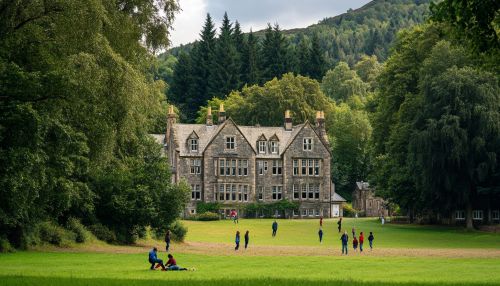Education in Scotland
Overview
Education in Scotland is a distinctive and integral part of the country's cultural and social fabric, characterized by its unique system that has evolved over centuries. Governed by the Scottish Government, education in Scotland is structured differently from the rest of the United Kingdom, with a strong emphasis on comprehensive education and a broad curriculum. The Scottish education system is renowned for its commitment to inclusivity, accessibility, and quality, aiming to provide lifelong learning opportunities for all citizens.
Historical Development
The roots of education in Scotland can be traced back to the medieval period, with the establishment of monastic schools and universities such as the University of St Andrews, founded in 1413. The Reformation in the 16th century marked a significant turning point, as the Church of Scotland advocated for universal education to promote literacy and religious understanding. The Education Act of 1696 was a landmark legislation that mandated the establishment of a school in every parish, laying the foundation for a national education system.
The 19th century saw further reforms, including the Education (Scotland) Act of 1872, which made education compulsory for children aged 5 to 13 and transferred control of schools from the Church to local school boards. The 20th century brought about the introduction of the comprehensive school system, replacing the selective grammar school model and emphasizing equal opportunities for all students.
Structure of the Education System
Early Years Education
Early years education in Scotland caters to children from birth to the age of five. It is provided through a combination of nursery classes, private nurseries, and childminders. The Scottish Government offers funded early learning and childcare for all three and four-year-olds, as well as eligible two-year-olds. The Curriculum for Excellence (CfE) framework guides early years education, focusing on play-based learning and the development of key skills such as communication, numeracy, and social interaction.
Primary Education
Primary education in Scotland spans seven years, from Primary 1 (P1) to Primary 7 (P7), typically for children aged 5 to 12. The CfE framework is central to primary education, promoting a holistic approach to learning that encompasses literacy, numeracy, health and wellbeing, and expressive arts. Primary schools aim to foster a supportive and inclusive environment, encouraging active participation and personal development.
Secondary Education
Secondary education in Scotland is divided into two phases: the Broad General Education (BGE) and the Senior Phase. The BGE covers the first three years of secondary school (S1 to S3), where students continue to follow the CfE framework, exploring a wide range of subjects. The Senior Phase (S4 to S6) allows students to specialize in subjects of their choice, leading to qualifications such as the Scottish Qualifications Authority (SQA) National 4 and 5, Higher, and Advanced Higher.
Further and Higher Education
Further education (FE) in Scotland encompasses a variety of post-secondary education options, including vocational courses, apprenticeships, and access courses. FE colleges offer a diverse range of programs, catering to students seeking practical skills and qualifications for employment or progression to higher education.
Higher education in Scotland is provided by universities and higher education institutions, offering undergraduate and postgraduate degrees. Scottish universities are renowned for their research excellence and diverse academic offerings. The Scottish Government provides tuition fee support for Scottish and EU students, making higher education accessible to a broad demographic.
Curriculum for Excellence
The Curriculum for Excellence (CfE) is the national curriculum framework for Scottish education, implemented in 2010. It aims to equip learners with the knowledge, skills, and attributes necessary for the 21st century. The CfE is designed around four capacities: successful learners, confident individuals, responsible citizens, and effective contributors. It emphasizes interdisciplinary learning, critical thinking, and personal development, encouraging students to take an active role in their education.
Assessment and Qualifications
The Scottish Qualifications Authority (SQA) is responsible for developing, accrediting, and awarding qualifications in Scotland. The assessment system is designed to be flexible and inclusive, accommodating a wide range of learning styles and abilities. National qualifications, including National 4 and 5, Higher, and Advanced Higher, are the mainstay of secondary education assessment. These qualifications are recognized for entry into further and higher education, as well as employment.
Educational Policy and Governance
Education in Scotland is governed by the Scottish Government, with policy development and implementation overseen by the Education and Skills Directorate. Local authorities are responsible for the delivery of education services, including the management of schools and allocation of resources. The General Teaching Council for Scotland (GTCS) regulates the teaching profession, ensuring high standards of professional conduct and competence.
Challenges and Reforms
The Scottish education system faces several challenges, including addressing educational inequalities, improving attainment levels, and adapting to technological advancements. Recent reforms have focused on closing the attainment gap, enhancing teacher professional development, and integrating digital learning tools. The Scottish Government continues to prioritize education as a key driver of social and economic progress, investing in initiatives to support learners and educators.
Image


